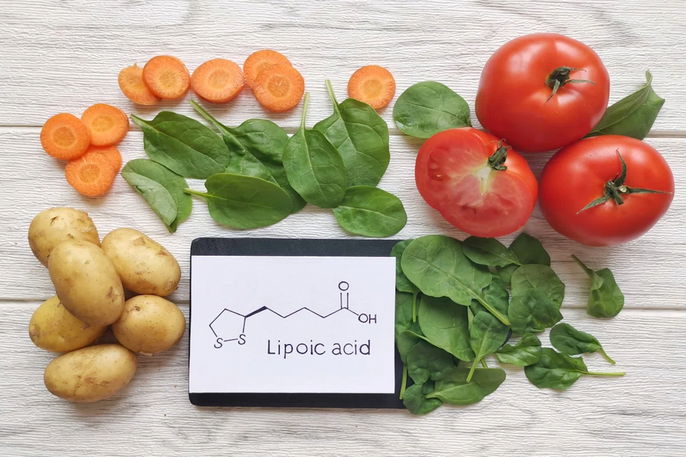Alpha-lipoic acid (ALA) is an antioxidant produced by the body that is found in every cell, helping transform glucose into energy. It may also help regulate blood sugar, support weight loss, and protect heart health.
Antioxidants like alpha-lipoic acid help reduce oxidative stress by preventing damage to healthy cells caused by free radicals. Production of alpha-lipoic acid decreases with age.
Alpha-lipoic acid can be found in certain foods, like meat and vegetables. A healthy, well-balanced diet is typically enough to maintain adequate levels of this antioxidant. Supplements may be indicated in cases of low consumption or used to help treat neuropathies.

Health benefits
Benefits of alpha-lipoic acid include:
1. Reducing oxidative stress
When food is ingested and metabolized by the body, a series of oxidative reactions occur in which small quantities of free radicals are produced. An excess of free radicals has been associated with tissue breakdown and the development of chronic and degenerative diseases.
Alpha-lipoic acid possesses antioxidant properties that help the body defend itself against free radicals. It can also help regenerate and reactivate other antioxidants, reducing oxidative stress.
2. Regulating blood sugar
Alpha-lipoic acid can help regulate blood sugar, primarily in people with type 2 diabetes and prediabetes. This is because diabetes triggers inflammation in the body, increasing the amount of free radicals.
Alpha-lipoic acid also helps improve the efficiency of insulin as well as glucose transport and absorption into the cells. This can help prevent or control diabetes by preventing insulin resistance and reducing blood sugar levels.
Also recommended: Prediabetes Diet: Food to Eat & Avoid (w/ 3-Day Meal Plan) tuasaude.com/en/prediabetes-diet3. Preventing and treating neuropathies
Alpha-lipoic acid helps prevent and improve symptoms related to neuropathies, including diabetic neuropathy, alcoholic neuropathy, and carpal tunnel syndrome. Alpha-lipoic acid protects the nerves against damage caused by free radicals and improves communication between the cells of the nervous system while also increasing their sensitivity.
4. Supporting weight loss
Alpha-lipoic acid may help support weight loss by reducing appetite. This is believed to occur due to inactivation of a molecule in the brain related to calorie consumption.
Further studies involving human subjects are needed to confirm this potential benefit.
5. Protecting heart health
Alpha-lipoic acid promotes vasodilation that can help improve blood flow to prevent high blood pressure.
The antioxidant effects of alpha-lipoic acid also help reduce levels of total cholesterol and triglycerides in people with metabolic syndrome, preventing the build up of plaque in the arteries and decreasing the risk for cardiovascular disease, including atherosclerosis, heart attack, and stroke.
Learn about what causes a heart attack.
6. Improving tinnitus
Alpha-lipoic acid can help reduce the intensity of tinnitus (ringing in the ears) as well as the psychological suffering of people with cochlear dysfunction associated with the metabolic syndrome.
Tinnitus is the perception of ringing, buzzing, or roaring in the ears, causing significant discomfort.
7. Preventing premature aging
The use of topical alpha-lipoic acid may help prevent premature aging by improving dry skin, increasing the production of collagen, and preventing damage caused by free radicals from exposure to sunlight.
These properties may also prevent and slow down the formation of lines and wrinkles associated with sun damage, in addition to protecting skin health in general.
8. Decreasing the risk of cancer
Due to its antioxidant properties, alpha-lipoic acid may inhibit the growth and proliferation of certain types of cancer cells, in addition to promoting tumor cell death.
Some studies have observed this effect in cancer cells taken from tumors of the breast, thyroid, lungs, and colon, as well as the Kelly cell line of human neuroblastoma. More studies are needed to confirm the benefits of alpha-lipoic acid for cancer treatment and prevention.
9. Maintaining brain health
Alpha-lipoic acid may help prevent dementia and Alzheimer's disease due to its antioxidant and anti-inflammatory properties and the fact that it increases the production of acetylcholine, a neurotransmitter that stimulates brain functions like memory, attention, and learning.
Food sources and supplements
Alpha-lipoic acid can be consumed through foods or in the form of supplements and topical creams.
1. Food sources
Foods rich in alpha-lipoic acid include red meat, potatoes, Brussels sprouts, carrots, spinach, green peas, brewer's yeast, and beets.
2. Supplements
Supplements may be prescribed by a doctor in cases of low consumption of alpha-lipoic acid or to help treat neuropathies.
The recommended dose is typically between 300 and 600 mg per day, preferably combined with other antioxidants like glutathione, vitamin C, vitamin E, selenium, or coenzyme Q10, for example.
Alpha-lipoic acid supplements should be taken between meals, at least 2 hours after a meal, as taking it with food can decrease its absorption.
3. Topical creams
Alpha-lipoic acid can also be added to topical creams along with other ingredients and should be used in a concentration of 1 to 5%. These creams should only be used under the supervision of a dermatologist.
Side effects
Possible side effects of excessive consumption of alpha-lipoic acid include stomachache, diarrhea, headache, migraine, skin rash, and skin irritation.
In addition, alpha-lipoic acid can cause hypoglycemia when taken along with medications to control diabetes, resulting in symptoms like dizziness, nausea, cold sweats, tremors, and weakness.
Contraindications to use
Alpha-lipoic acid supplements should be avoided during pregnancy and lactation and should not be given to children unless approved by a doctor. This is due to a lack of studies confirming the safety of alpha-lipoic acid supplements in these populations.
People undergoing chemotherapy or who take medications like oral hypoglycemics, levothyroxine, or vitamin B1, should always consult their doctor before taking alpha-lipoic supplements. This is due to a potential interaction between alpha-lipoic acid supplements and these medications that can lead to unwanted effects.






























